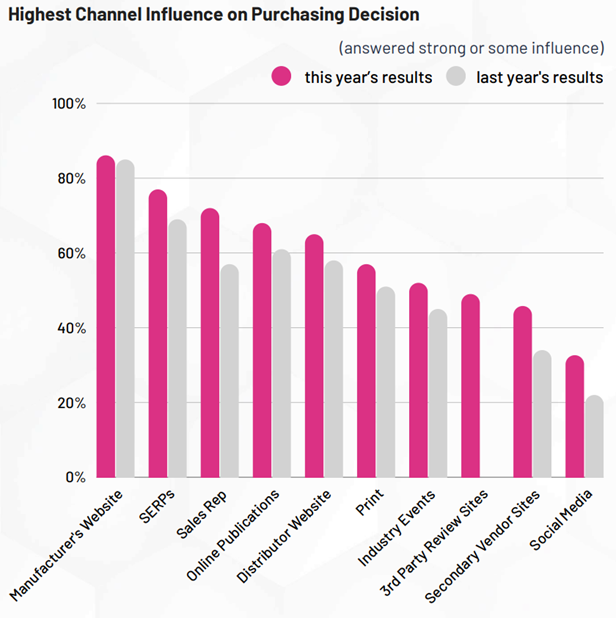If you’re looking to boost your online presence and drive more customers to your website, you will have definitely seen an article or two on search engine optimisation (SEO) and its importance in making your website more visible to online users.
SEO as a marketing tool has really taken off in recent years, with Google Trends data showing a steady increase in Google searches since June 2018. Searches peaked at the height of the COVID-19 pandemic between March and July 2020[i], when many businesses had no choice but to move their operations online to keep pace with the evolution of how people were working, accessing content and services, and more.
But with a multitude of materials (around 1,260,000,000 results on Google alone![ii]) about SEO available at your fingertips, even knowing where to start can feel like an insurmountable task.
In this blog, we’ll be focussing on the importance of keywords in your SEO strategy for the pharmaceutical and life science sectors, and where to begin.
Finding the best keywords for your page
While it might feel like there are thousands of keywords available for picking, it’s important to tailor your efforts to ensure that your keywords are attracting the right people to your page. We recommend putting yourself in the customers’ shoes to begin with – what are your customers looking for when they come to your website? What are they expecting to see? This should give you a list of key phrases from the outset – for example, if you sell liquid chromatography systems and consumables, you should be thinking about incorporating keywords such as ‘HPLC systems’, ‘UHPLC instruments’, or ‘liquid chromatography supplies’.
From there, begin to consider other relevant keywords that could tie in to what you customers are looking for. Maybe they’re looking for a system that’s best suited to their application or area of research, so you might want to bring in phrases such as ‘oligonucleotide analysis’ or ‘analysis of antibody-based therapeutics’. Not only does this allow you to widen the net and bring in more users who are searching for things that relate to your product, but it can also put you in front of users who may not have come across your brand before, or may not be aware that you can offer a product or service that meets their requirements.
Assessing the competition
Once you’ve gathered a list of keywords, it’s also important to look at your competitors and see what they’re doing.
Take a look at your competitors’ websites, or even specific pages if there are certain areas in particular that compete with your own products and services. Look for specific keywords that jump out at you, or are repeated across the page. Take note of the keywords used in both headings and body text, and how these are used. You may come across relevant keywords that didn’t cross your mind previously, or you may notice that they use variations of the same keyword across the page to capture the majority of users searching for similar terms, such as ‘gas chromatography (GC)’, ‘GC systems’, and ‘GC-MS solutions’.
Auditing your competitors’ websites for keyword usage goes beyond what you can see on the page, and looking at the metadata can also offer some really interesting insight into what is going on behind the scenes to boost search visibility. Not only can you see whether your competitors are using keywords in their metadata, but you can also see how the page has been built to make it search engine friendly. It’s important to note that Google ranks pages on readability as well as keywords, and employing the correct usage of H-tags, optimising images with alt text, and including keywords across meta descriptions and meta keywords, will all contribute towards making a page rank more highly on search engines.
Identifying gaps
It’s time to put your keywords to the test. Enter your search terms into a search engine, take a look at the results that come up, and ask the following questions:
⦿ Are my competitors ranking for this keyword?
Who’s appearing on the first page of search results? If it’s one of your competitors, there’s a very good chance you’re targeting the right keywords, and giving yourself the chance to appear alongside them in the search engine results page (SERP). If they aren’t appearing – why aren’t they appearing? Maybe they’re focusing their efforts on other keywords you previously hadn’t considered, or maybe they don’t see value in targeting that specific keyword. Look at your keywords with a critical eye, and ask whether any of your keywords are too specific (for example, they incorporate a brand name or trademark), or even too vague (for example, while ‘consumables’ directly applies to HPLC columns and supplies, beyond the life science world, ‘consumables’ also relates to food, household items, and other regularly replaced commodities).
⦿ What kind of content is ranking for this keyword?
Is it companies similar to your own, selling products and services? Or is it informational sources, such as scientific publications? Analysing the type of content appearing for specific search terms can offer you key insight into search intent.
Search intent refers to the intent of the user who is searching for specific keywords and queries – for example, a user looking for ‘HPLC’ could have informational intent, and is just looking for more information about the analytical technique, whereas a user searching for ‘HPLC instruments’ may have commercial or transactional intent, and be looking for products available on the market to inform an upcoming purchase. Understanding search intent can help you to attract more users who are more likely to find what they’re looking for on your website, which may lead to a desirable outcome such as a purchase or enquiry. It can also help you to avoid drawing in users who will visit your website, and then leave if it doesn’t fulfil their search intent (which can have a negative impact on your SEO).
⦿ What else is coming up on the SERP?
‘People also ask’ and Google Quick Answers can also offer you more insight into what sort of searches users are conducting, and the kinds of responses they’re looking for.
Google Quick Answers refers to the snippet of text that appears at the top of a results page, to offer users the answer they need without having to navigate to a website. ‘People also ask’ is another useful snippet tool, where Google lists 3-4 frequently asked questions it deems related to a search, to offer an answer based on what other users have been searching for. Both of these tools offer users the information they need at the click of a mouse, and paying attention to these tools and the kind of information they display can also help to inform your SEO strategy.
For example, if you search ‘HPLC applications’, you could use the ‘People also ask’ tool to see what kind of questions users are searching for related to ‘HPLC applications’. You could then consider drafting a blog to answer these questions, such as ‘what are the applications of HPLC in clinical diagnostics?’, to improve your chances of appearing for that keyword.
⦿ Is my page ranking for my keywords?
If you’re in a particularly competitive space, there is always the chance that the keywords relevant to your page might also be relevant to lots of others – which can lead to a lot of competition over keywords.
The solution? Long-tail keywords.
Long-tail keywords are search queries that consist of a short string of phrases, that are still as relevant to your page, but may have fewer pages competing for the top spot. For example, a search for ‘gas chromatography’ may be a very competitive term that most leading vendors are optimising their pages for. However, if you have a strong customer base in food analysis and are looking to bring in more customers in that industry, you might want to look at a long-tail keyword such as ‘gas chromatography systems for food analysis’ – the search term is still relevant to your page and includes ‘gas chromatography’ as a keyword, but you’re less likely to face intense competition, and more likely to become and remain visible to users in this area.
Maintaining your SEO strategy
Once you’ve asked yourself the hard questions and pulled together a foolproof SEO strategy, it can be tempting to sit back and mark the job as completed. However, SEO work is never finished, and if you want your page to stay visible, the effort must be sustained to ensure your page continues to perform well on Google Search.
Trends come and go, and user search habits are bound to change over time – for example, Google Trends data shows how users in the early 2000’s were more likely to search for ‘pharmaceutical’, however in recent years the playing field has evolved, and we can see a shift as a greater number of users are increasingly searching for the shortened version of the phrase ‘pharma’.[iii]

Figure 1: A graph showing Google Trends global search data for the terms ‘pharmaceutical’ and ‘pharma’ between January 2004 and February 2023. The blue line shows the amount of searches for ‘pharmaceutical’ during the period, while the red line represents searches for ‘pharma’. While ‘pharmaceutical’ was previously the preferred search term in the early 2000s, we can see that ‘pharma’ has quickly overtaken this as the preferred search term, suggesting a shift in user search habits.
![]() Searches for ‘pharmaceutical’
Searches for ‘pharmaceutical’
![]() Searches for ‘pharma’
Searches for ‘pharma’
In the life science and pharmaceutical space, there is the added consideration that technology is continuously advancing, and with new and evolving solutions and instrumentation making their way to market, there will always be room for further optimisation to keep pace with emerging technologies.
To learn more about how our dedicated team can support your keyword research and take the stress out of SEO, contact us today.
[i] ‘SEO’ global search term data from January 2004 – January 2023, Google Trends [accessed 31st January 2023] https://trends.google.com/trends/explore?date=all&q=SEO
[ii] Google search engine results for ‘SEO’ [accessed 31st January 2023]
[iii] ‘Pharmaceutical’ and ‘pharma’ global search term data from January 2004 – February 2023, Google Trends [accessed 2nd February 2023] https://trends.google.com/trends/explore?date=all&q=Pharmaceutical,Pharma




.png)

